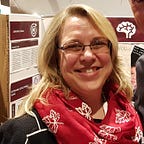D is for Debate
“It is better to debate a question without settling it than to settle a question without debating it.”
― Joseph Joubert
Debate is the cornerstone of freedom and democracy and without healthy debate, we lose. Noam Chomsky outlines the dangers of not having truly free debate: “The smart way to keep people passive and obedient is to strictly limit the spectrum of acceptable opinion, but allow very lively debate within that spectrum — even encourage the more critical and dissident views. That gives people the sense that there’s free thinking going on, while all the time the presuppositions of the system are being reinforced by the limits put on the range of the debate.”
Unfortunately, social media and the internet have encouraged the sort of non-debate that Chomsky alludes to. A healthy debate is difficult when people vilify their opponent to a pariah state as so often happens the minute someone suggests an alternate view. Attack is not debate. How do we learn, if not from discussion and debate, even when we are passionate about the subject matter?
Furthermore, as Carl Sagan notes in Dragons of Eden: Speculations on the Evolution of Human Intelligence, “Those at too great a distance may, I am well aware, mistake ignorance for perspective.” People seem to like weighing in, thinking they have perspective, but in reality, they don’t have all the details at all. Think of pictures and posts where people comment viciously, yet they don’t know the whole story? No one seems to wait to hear both sides and weigh the fats judiciously. It’s all about siding with the “right” answer — which is not to say always right, but merely popular.
We have come to a point where we must question: “Is there any point in public debate in a society where hardly anyone has been taught how to think, while millions have been taught what to think?” as Peter Hitchens so pointedly queried. The crux of the question is have we actually been taught to think? I think for a great many, yes we have, but unfortunately, there are those who jump on the bandwagon with little thought clinging fiercely to the ‘what to think’ beliefs they hold as sacrosanct.
In this light, it becomes ever more important to ensure we protect education and teaching how to think, for thinking is the basis of all learning. We need to include the activities that offer experience and encourage reflection. As John Dewey states: “We do not learn from experience… we learn from reflecting on experience.” Better yet, give students problems to solve, and I don’t mean just a math problem, I mean real-world problems. Dewey also weighed in on this idea: “give the pupils something to do, not something to learn; and the doing is of such a nature as to demand thinking; learning naturally results” because he continues, “we only think when confronted with a problem.”
Originally published at wordsgrow.wordpress.com on March 29, 2019.
